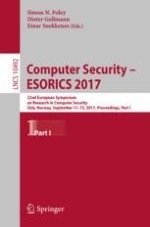2017 | OriginalPaper | Chapter
Verifying Constant-Time Implementations by Abstract Interpretation
Authors : Sandrine Blazy, David Pichardie, Alix Trieu
Published in: Computer Security – ESORICS 2017
Publisher: Springer International Publishing
Activate our intelligent search to find suitable subject content or patents.
Select sections of text to find matching patents with Artificial Intelligence. powered by
Select sections of text to find additional relevant content using AI-assisted search. powered by
